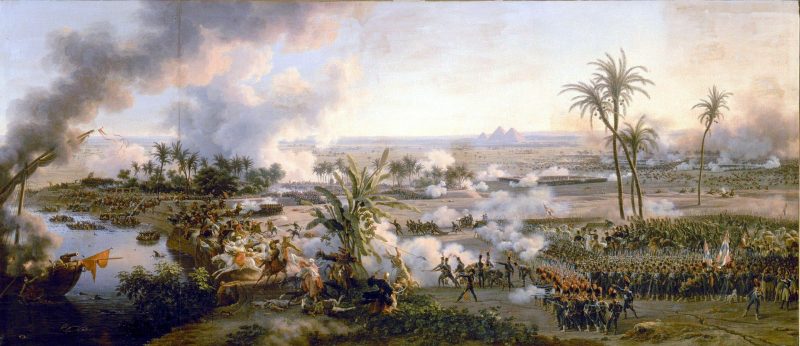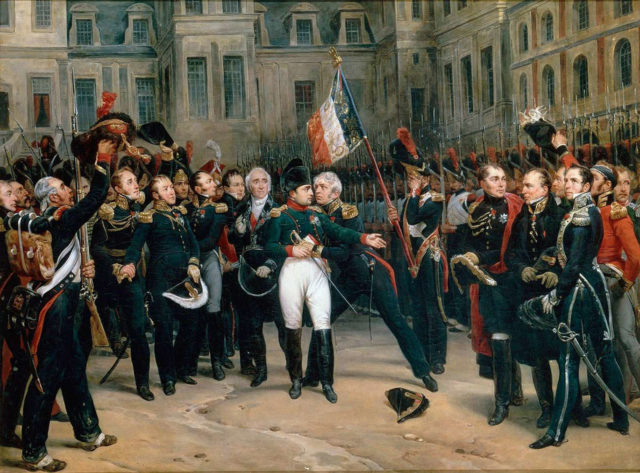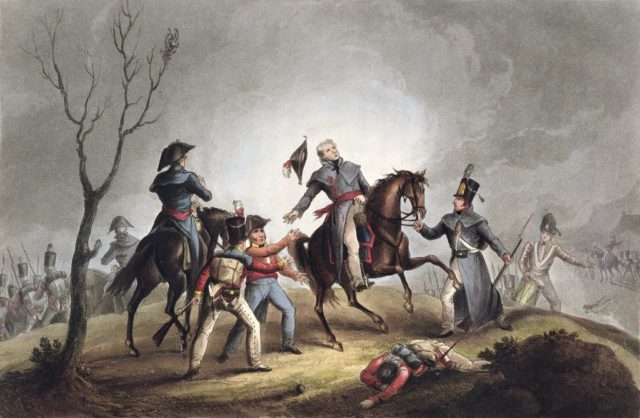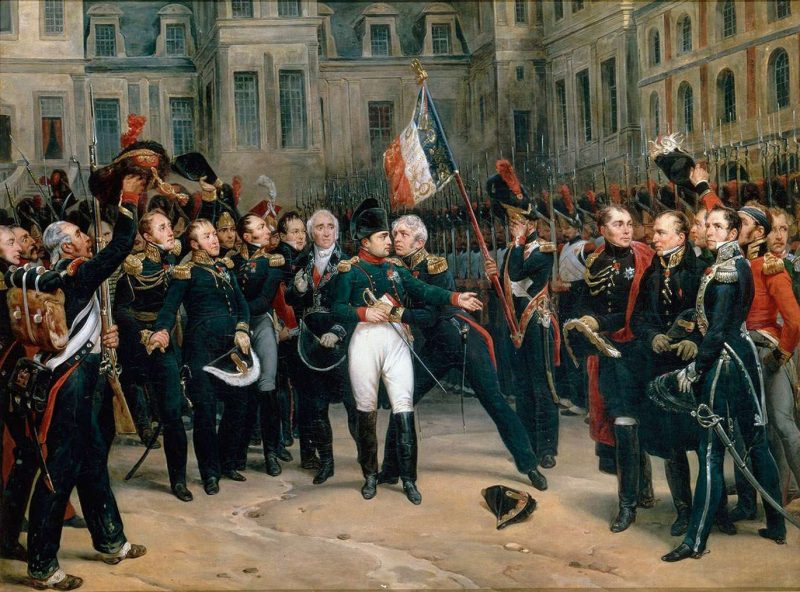Fought between 1807 and 1814, the Peninsula War was one of the most important theaters of the Napoleonic Wars. Due to the limits of communication at the time, the most senior commanders had to be near the battle lines to know what was happening. Many officers on both sides gave their lives in circumstances that ranged from the heroic to the tragic to the absurd.
Captain Farinas
Spaniards fought on both sides during the war. Even when their nation became a French puppet, some preferred Imperial French values to those of the old regime.
One of them was Captain Farinas, an artillery commander. He took part in the defense of Badajoz in 1812. The French and their supporters defended the city against a British and Portuguese army under the future Duke of Wellington. The Allies stormed the city, and many Spaniards among the defenders fell into the hands of their fellow countrymen. Bad feelings within the nation led to them being shot, including five officers.
Farinas avoided that fate through a spectacular form of suicide. He stood in front of a mortar and fired it, ending his life in explosive fashion.
Baron Jean-Guillaume-Barthélemy Thomières
Thomières went to Spain with the first French army, leading a division under Junot. He was wounded at the Battle of Vimeiro in August 1808.
Promoted to general, he was given command of the 7th Division of VIII Corps in the French Army of Portugal. He led the division at the Battle of Salamanca in 1812. Caught by surprise during the fight, he was fatally wounded, and his troops chased off in disarray. He died behind enemy lines.
General Alexandre-Antoine Hureau, Baron de Senarmont
Following in his father’s footsteps, Hureau was an artillery commander who eventually became a general. One of the best gunners of his generation, he won fame through the successful use of massed batteries. Traditionally, artillery had been utilized in a supporting role on the battlefield. Massed batteries turned it into a devastating offensive weapon and a hallmark of Napoleonic French armies.
Hureau was made a baron in 1808 and artillery commander of the French Army of Spain in 1809. In October 1810, while commanding artillery at the siege of Cadiz, he was killed by a howitzer shell.

General Benito San Juan
In 1808, San Juan was put in command of Spanish forces defending Madrid against the advancing French. Ordered to defend Somosierra pass, he divided his forces and was defeated by Napoleon. As he tried to rally his reserve, he was injured twice in the head by sword-cuts.
Despite his wounds, San Juan survived, but his men mutinied at Talavera six days later. They accused him of leading them into a surrender. He tried to escape but was shot and hanged from a tree.
Comte François-Amable Ruffin
A French general, Ruffin served in Spain from 1808 until 1811. At the Battle of Barossa on March 5, 1811, his forces were beaten by a British counter-attack. A rifle shot went through his neck and hit him in the spine.
Left paralyzed, Ruffin was captured by the British. They did their best to care for him, and he appeared to recover. However, he relapsed and died on May 15 on a transport ship heading for England.
General Theodore de Reding
Many officers from other countries fought for the nations engaged in the Peninsula War. Among the Swiss who were present, one of the most prominent was General Reding. Known for his honesty and bravery, his leadership was sadly not as strong as his moral character.
Commanding Spanish forces against the French in 1808-9, he suffered a series of defeats. In February 1809, he was wounded several times during fighting at Valls. He retreated with the remains of his army to Tarragona, then died of his injuries.

Lieutenant-General Sir John Moore
One of the finest British commanders of his generation, Moore was second only to Wellington in skill and renown. Thoughtful, experienced, and innovative, he played a vital part in the development of light infantry tactics. He advanced through the ranks despite Whig political affiliations which set him at odds with the most powerful elements of the British establishment.
Despite having commanded in his own right, he was sent to the Peninsula as deputy to Generals Burrard and Dalrymple. They were responsible for Britain’s initial failings in the campaign. After they had been removed, he inherited command of British forces.

Moore led the Corunna campaign. It achieved a strategic success by drawing Napoleon’s attention away from crushing the Spanish. It also resulted in a retreat of the British forces, who had to be evacuated. Moore died after being hit in the shoulder by a cannonball at the Battle of Corunna in January 1809.
Moore’s political opponents tried to besmirch his reputation posthumously. William Napier began writing his great history of the campaign as a way to defend Moore’s reputation.
Major-General John Gaspard Le Marchant
A British cavalry officer, Le Marchant was a progressive thinker. Having seen British failures in the Netherlands, he was determined that the army should learn from them. He was behind the army’s manual on swordsmanship, the redesign of cavalry sabers, and the founding of military schools at Marlow and High Wycombe.
Promoted to major-general in 1811, he took command of a heavy cavalry brigade. He led a decisive charge at Salamanca and engaged in hand-to-hand combat as his forces pursued the French when they fell back. Wearing his old blue dragoon uniform, he stood out amid his red-jacketed men and was killed by a shot from the retreating French.
General Pierre Bellon Lapisse, Baron de Saint-Hélène
Lapisse’s achievements in the Peninsula were variable. He accomplished a decisive attack at Espinosa but was timid in advancing into Portugal. He took Alcantara and committed acts of brutality during its sacking. Injured at Talavera, he died of his wounds.
Source:
Philip Haythornthwaite (2004), The Peninsular War: The Complete Companion to the Iberian Campaigns 1807-14
